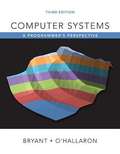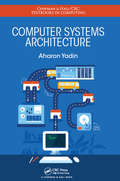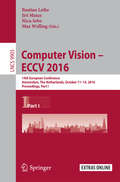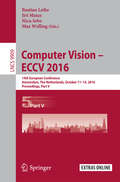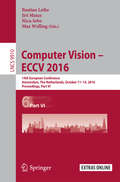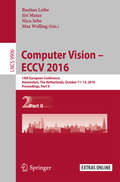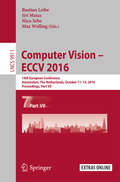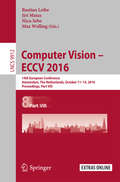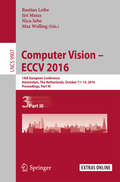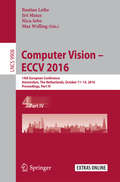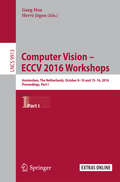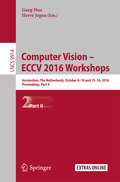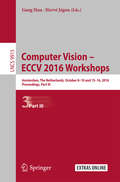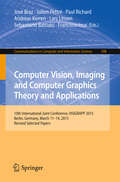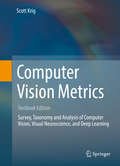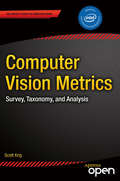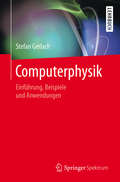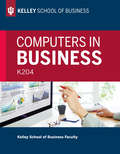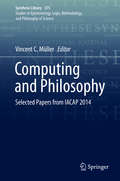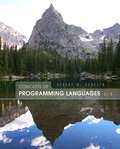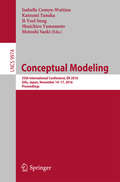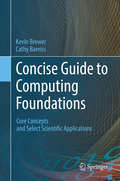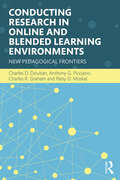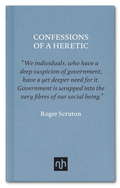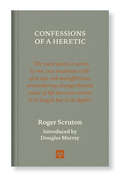- Table View
- List View
Computer Systems: A Programmer's Perspective, Third Edition
by Randal E. Bryant David R. O'HallaronThis book (known as CS: APP) is for computer scientists, computer engineers, and others who want to be able to write better programs by learning what is going on "under the hood" of a computer system.
Computer Systems Architecture (Chapman & Hall/CRC Textbooks in Computing)
by Aharon YadinComputer Systems Architecture provides IT professionals and students with the necessary understanding of computer hardware. It addresses the ongoing issues related to computer hardware and discusses the solutions supplied by the industry. The book describes trends in computing solutions that led to the current available infrastructures, tracing the initial need for computers to recent concepts such as the Internet of Things. It covers computers’ data representation, explains how computer architecture and its underlying meaning changed over the years, and examines the implementations and performance enhancements of the central processing unit (CPU). It then discusses the organization, hierarchy, and performance considerations of computer memory as applied by the operating system and illustrates how cache memory significantly improves performance. The author proceeds to explore the bus system, algorithms for ensuring data integrity, input and output (I/O) components, methods for performing I/O, various aspects relevant to software engineering, and nonvolatile storage devices, such as hard drives and technologies for enhancing performance and reliability. He also describes virtualization and cloud computing and the emergence of software-based systems’ architectures. Accessible to software engineers and developers as well as students in IT disciplines, this book enhances readers’ understanding of the hardware infrastructure used in software engineering projects. It enables readers to better optimize system usage by focusing on the principles used in hardware systems design and the methods for enhancing performance.
Computer Vision – ECCV 2016: 14th European Conference, Amsterdam, The Netherlands, October 11–14, 2016, Proceedings, Part I (Lecture Notes in Computer Science #9905)
by Nicu Sebe Bastian Leibe Jiri Matas Max WellingThe eight-volume set comprising LNCS volumes 9905-9912 constitutes the refereed proceedings of the 14th European Conference on Computer Vision, ECCV 2016, held in Amsterdam, The Netherlands, in October 2016. The 415 revised papers presented were carefully reviewed and selected from 1480 submissions. The papers cover all aspects of computer vision and pattern recognition such as 3D computer vision; computational photography, sensing and display; face and gesture; low-level vision and image processing; motion and tracking; optimization methods; physics-based vision, photometry and shape-from-X; recognition: detection, categorization, indexing, matching; segmentation, grouping and shape representation; statistical methods and learning; video: events, activities and surveillance; applications. They are organized in topical sections on detection, recognition and retrieval; scene understanding; optimization; image and video processing; learning; action, activity and tracking; 3D; and 9 poster sessions.
Computer Vision – ECCV 2016: 14th European Conference, Amsterdam, The Netherlands, October 11-14, 2016, Proceedings, Part V (Lecture Notes in Computer Science #9909)
by Nicu Sebe Bastian Leibe Jiri Matas Max WellingThe eight-volume set comprising LNCS volumes 9905-9912 constitutes the refereed proceedings of the 14th European Conference on Computer Vision, ECCV 2016, held in Amsterdam, The Netherlands, in October 2016. The 415 revised papers presented were carefully reviewed and selected from 1480 submissions. The papers cover all aspects of computer vision and pattern recognition such as 3D computer vision; computational photography, sensing and display; face and gesture; low-level vision and image processing; motion and tracking; optimization methods; physics-based vision, photometry and shape-from-X; recognition: detection, categorization, indexing, matching; segmentation, grouping and shape representation; statistical methods and learning; video: events, activities and surveillance; applications. They are organized in topical sections on detection, recognition and retrieval; scene understanding; optimization; image and video processing; learning; action, activity and tracking; 3D; and 9 poster sessions.
Computer Vision – ECCV 2016: 14th European Conference, Amsterdam, The Netherlands, October 11-14, 2016, Proceedings, Part VI (Lecture Notes in Computer Science #9910)
by Nicu Sebe Bastian Leibe Jiri Matas Max WellingThe eight-volume set comprising LNCS volumes 9905-9912 constitutes the refereed proceedings of the 14th European Conference on Computer Vision, ECCV 2016, held in Amsterdam, The Netherlands, in October 2016. The 415 revised papers presented were carefully reviewed and selected from 1480 submissions. The papers cover all aspects of computer vision and pattern recognition such as 3D computer vision; computational photography, sensing and display; face and gesture; low-level vision and image processing; motion and tracking; optimization methods; physics-based vision, photometry and shape-from-X; recognition: detection, categorization, indexing, matching; segmentation, grouping and shape representation; statistical methods and learning; video: events, activities and surveillance; applications. They are organized in topical sections on detection, recognition and retrieval; scene understanding; optimization; image and video processing; learning; action, activity and tracking; 3D; and 9 poster sessions.
Computer Vision – ECCV 2016: 14th European Conference, Amsterdam, The Netherlands, October 11-14, 2016, Proceedings, Part II (Lecture Notes in Computer Science #9906)
by Nicu Sebe Bastian Leibe Jiri Matas Max WellingThe eight-volume set comprising LNCS volumes 9905-9912 constitutes the refereed proceedings of the 14th European Conference on Computer Vision, ECCV 2016, held in Amsterdam, The Netherlands, in October 2016. The 415 revised papers presented were carefully reviewed and selected from 1480 submissions. The papers cover all aspects of computer vision and pattern recognition such as 3D computer vision; computational photography, sensing and display; face and gesture; low-level vision and image processing; motion and tracking; optimization methods; physics-based vision, photometry and shape-from-X; recognition: detection, categorization, indexing, matching; segmentation, grouping and shape representation; statistical methods and learning; video: events, activities and surveillance; applications. They are organized in topical sections on detection, recognition and retrieval; scene understanding; optimization; image and video processing; learning; action, activity and tracking; 3D; and 9 poster sessions.
Computer Vision – ECCV 2016: 14th European Conference, Amsterdam, The Netherlands, October 11–14, 2016, Proceedings, Part VII (Lecture Notes in Computer Science #9911)
by Nicu Sebe Bastian Leibe Jiri Matas Max WellingThe eight-volume set comprising LNCS volumes 9905-9912 constitutes the refereed proceedings of the 14th European Conference on Computer Vision, ECCV 2016, held in Amsterdam, The Netherlands, in October 2016. The 415 revised papers presented were carefully reviewed and selected from 1480 submissions. The papers cover all aspects of computer vision and pattern recognition such as 3D computer vision; computational photography, sensing and display; face and gesture; low-level vision and image processing; motion and tracking; optimization methods; physics-based vision, photometry and shape-from-X; recognition: detection, categorization, indexing, matching; segmentation, grouping and shape representation; statistical methods and learning; video: events, activities and surveillance; applications. They are organized in topical sections on detection, recognition and retrieval; scene understanding; optimization; image and video processing; learning; action, activity and tracking; 3D; and 9 poster sessions.
Computer Vision – ECCV 2016: 14th European Conference, Amsterdam, The Netherlands, October 11-14, 2016, Proceedings, Part VIII (Lecture Notes in Computer Science #9912)
by Nicu Sebe Bastian Leibe Jiri Matas Max WellingThe eight-volume set comprising LNCS volumes 9905-9912 constitutes the refereed proceedings of the 14th European Conference on Computer Vision, ECCV 2016, held in Amsterdam, The Netherlands, in October 2016. The 415 revised papers presented were carefully reviewed and selected from 1480 submissions. The papers cover all aspects of computer vision and pattern recognition such as 3D computer vision; computational photography, sensing and display; face and gesture; low-level vision and image processing; motion and tracking; optimization methods; physics-based vision, photometry and shape-from-X; recognition: detection, categorization, indexing, matching; segmentation, grouping and shape representation; statistical methods and learning; video: events, activities and surveillance; applications. They are organized in topical sections on detection, recognition and retrieval; scene understanding; optimization; image and video processing; learning; action, activity and tracking; 3D; and 9 poster sessions.
Computer Vision – ECCV 2016: 14th European Conference, Amsterdam, The Netherlands, October 11-14, 2016, Proceedings, Part III (Lecture Notes in Computer Science #9907)
by Nicu Sebe Bastian Leibe Jiri Matas Max WellingThe eight-volume set comprising LNCS volumes 9905-9912 constitutes the refereed proceedings of the 14th European Conference on Computer Vision, ECCV 2016, held in Amsterdam, The Netherlands, in October 2016. The 415 revised papers presented were carefully reviewed and selected from 1480 submissions. The papers cover all aspects of computer vision and pattern recognition such as 3D computer vision; computational photography, sensing and display; face and gesture; low-level vision and image processing; motion and tracking; optimization methods; physics-based vision, photometry and shape-from-X; recognition: detection, categorization, indexing, matching; segmentation, grouping and shape representation; statistical methods and learning; video: events, activities and surveillance; applications. They are organized in topical sections on detection, recognition and retrieval; scene understanding; optimization; image and video processing; learning; action, activity and tracking; 3D; and 9 poster sessions.
Computer Vision – ECCV 2016: 14th European Conference, Amsterdam, The Netherlands, October 11–14, 2016, Proceedings, Part IV (Lecture Notes in Computer Science #9908)
by Nicu Sebe Bastian Leibe Jiri Matas Max WellingThe eight-volume set comprising LNCS volumes 9905-9912 constitutes the refereed proceedings of the 14th European Conference on Computer Vision, ECCV 2016, held in Amsterdam, The Netherlands, in October 2016. The 415 revised papers presented were carefully reviewed and selected from 1480 submissions. The papers cover all aspects of computer vision and pattern recognition such as 3D computer vision; computational photography, sensing and display; face and gesture; low-level vision and image processing; motion and tracking; optimization methods; physics-based vision, photometry and shape-from-X; recognition: detection, categorization, indexing, matching; segmentation, grouping and shape representation; statistical methods and learning; video: events, activities and surveillance; applications. They are organized in topical sections on detection, recognition and retrieval; scene understanding; optimization; image and video processing; learning; action, activity and tracking; 3D; and 9 poster sessions.
Computer Vision – ECCV 2016 Workshops: Amsterdam, The Netherlands, October 8-10 and 15-16, 2016, Proceedings, Part I (Lecture Notes in Computer Science #9913)
by Gang Hua Hervé JégouThe three-volume set LNCS 9913, LNCS 9914, and LNCS 9915 comprises the refereed proceedings of the Workshops that took place in conjunction with the 14th European Conference on Computer Vision, ECCV 2016, held in Amsterdam, The Netherlands, in October 2016. The three-volume set LNCS 9913, LNCS 9914, and LNCS 9915 comprises the refereed proceedings of the Workshops that took place in conjunction with the 14th European Conference on Computer Vision, ECCV 2016, held in Amsterdam, The Netherlands, in October 2016. 27 workshops from 44 workshops proposals were selected for inclusion in the proceedings. These address the following themes: Datasets and Performance Analysis in Early Vision; Visual Analysis of Sketches; Biological and Artificial Vision; Brave New Ideas for Motion Representations; Joint ImageNet and MS COCO Visual Recognition Challenge; Geometry Meets Deep Learning; Action and Anticipation for Visual Learning; Computer Vision for Road Scene Understanding and Autonomous Driving; Challenge on Automatic Personality Analysis; BioImage Computing; Benchmarking Multi-Target Tracking: MOTChallenge; Assistive Computer Vision and Robotics; Transferring and Adapting Source Knowledge in Computer Vision; Recovering 6D Object Pose; Robust Reading; 3D Face Alignment in the Wild and Challenge; Egocentric Perception, Interaction and Computing; Local Features: State of the Art, Open Problems and Performance Evaluation; Crowd Understanding; Video Segmentation; The Visual Object Tracking Challenge Workshop; Web-scale Vision and Social Media; Computer Vision for Audio-visual Media; Computer VISion for ART Analysis; Virtual/Augmented Reality for Visual Artificial Intelligence; Joint Workshop on Storytelling with Images and Videos and Large Scale Movie Description and Understanding Challenge.
Computer Vision – ECCV 2016 Workshops: Amsterdam, The Netherlands, October 8-10 and 15-16, 2016, Proceedings, Part II (Lecture Notes in Computer Science #9914)
by Gang Hua Hervé JégouThe three-volume set LNCS 9913, LNCS 9914, and LNCS 9915 comprises the refereed proceedings of the Workshops that took place in conjunction with the 14th European Conference on Computer Vision, ECCV 2016, held in Amsterdam, The Netherlands, in October 2016. The three-volume set LNCS 9913, LNCS 9914, and LNCS 9915 comprises the refereed proceedings of the Workshops that took place in conjunction with the 14th European Conference on Computer Vision, ECCV 2016, held in Amsterdam, The Netherlands, in October 2016. 27 workshops from 44 workshops proposals were selected for inclusion in the proceedings. These address the following themes: Datasets and Performance Analysis in Early Vision; Visual Analysis of Sketches; Biological and Artificial Vision; Brave New Ideas for Motion Representations; Joint ImageNet and MS COCO Visual Recognition Challenge; Geometry Meets Deep Learning; Action and Anticipation for Visual Learning; Computer Vision for Road Scene Understanding and Autonomous Driving; Challenge on Automatic Personality Analysis; BioImage Computing; Benchmarking Multi-Target Tracking: MOTChallenge; Assistive Computer Vision and Robotics; Transferring and Adapting Source Knowledge in Computer Vision; Recovering 6D Object Pose; Robust Reading; 3D Face Alignment in the Wild and Challenge; Egocentric Perception, Interaction and Computing; Local Features: State of the Art, Open Problems and Performance Evaluation; Crowd Understanding; Video Segmentation; The Visual Object Tracking Challenge Workshop; Web-scale Vision and Social Media; Computer Vision for Audio-visual Media; Computer VISion for ART Analysis; Virtual/Augmented Reality for Visual Artificial Intelligence; Joint Workshop on Storytelling with Images and Videos and Large Scale Movie Description and Understanding Challenge.
Computer Vision – ECCV 2016 Workshops: Amsterdam, The Netherlands, October 8-10 and 15-16, 2016, Proceedings, Part III (Lecture Notes in Computer Science #9915)
by Gang Hua Hervé JégouThe three-volume set LNCS 9913, LNCS 9914, and LNCS 9915 comprises the refereed proceedings of the Workshops that took place in conjunction with the 14th European Conference on Computer Vision, ECCV 2016, held in Amsterdam, The Netherlands, in October 2016. The three-volume set LNCS 9913, LNCS 9914, and LNCS 9915 comprises the refereed proceedings of the Workshops that took place in conjunction with the 14th European Conference on Computer Vision, ECCV 2016, held in Amsterdam, The Netherlands, in October 2016. 27 workshops from 44 workshops proposals were selected for inclusion in the proceedings. These address the following themes: Datasets and Performance Analysis in Early Vision; Visual Analysis of Sketches; Biological and Artificial Vision; Brave New Ideas for Motion Representations; Joint ImageNet and MS COCO Visual Recognition Challenge; Geometry Meets Deep Learning; Action and Anticipation for Visual Learning; Computer Vision for Road Scene Understanding and Autonomous Driving; Challenge on Automatic Personality Analysis; BioImage Computing; Benchmarking Multi-Target Tracking: MOTChallenge; Assistive Computer Vision and Robotics; Transferring and Adapting Source Knowledge in Computer Vision; Recovering 6D Object Pose; Robust Reading; 3D Face Alignment in the Wild and Challenge; Egocentric Perception, Interaction and Computing; Local Features: State of the Art, Open Problems and Performance Evaluation; Crowd Understanding; Video Segmentation; The Visual Object Tracking Challenge Workshop; Web-scale Vision and Social Media; Computer Vision for Audio-visual Media; Computer VISion for ART Analysis; Virtual/Augmented Reality for Visual Artificial Intelligence; Joint Workshop on Storytelling with Images and Videos and Large Scale Movie Description and Understanding Challenge.
Computer Vision, Imaging and Computer Graphics Theory and Applications: 10th International Joint Conference, VISIGRAPP 2015, Berlin, Germany, March 11-14, 2015, Revised Selected Papers (Communications in Computer and Information Science #598)
by Sebastiano Battiato Julien Pettré Andreas Kerren José Braz Lars Linsen Paul Richard Francisco ImaiThis bookconstitutes thoroughly revised and selected papers from the 10thInternational Joint Conference on Computer Vision, Imaging and ComputerGraphics Theory and Applications, VISIGRAPP 2015, held in Berlin, Germany, inMarch 2015. VISIGRAPP comprises GRAPP, International Conference on ComputerGraphics Theory and Applications; IVAPP, International Conference onInformation Visualization Theory and Applications; and VISAPP, InternationalConference on Computer Vision Theory and Applications. The 23 thoroughly revised and extended papers presented in this volume werecarefully reviewed and selected from 529 submissions. The book also containsone invited talk in full-paper length. The regular papers were organized intopical sections named: computer graphics theory and applications; informationvisualization theory and applications; and computer vision theory andapplications.
Computer Vision Metrics: Textbook Edition
by Scott KrigBased on the successful 2014 book published by Apress, this textbook edition is expanded to provide a comprehensive history and state-of-the-art survey for fundamental computer vision methods. With over 800 essential references, as well as chapter-by-chapter learning assignments, both students and researchers can dig deeper into core computer vision topics. The survey covers everything from feature descriptors, regional and global feature metrics, feature learning architectures, deep learning, neuroscience of vision, neural networks, and detailed example architectures to illustrate computer vision hardware and software optimization methods. To complement the survey, the textbook includes useful analyses which provide insight into the goals of various methods, why they work, and how they may be optimized. The text delivers an essential survey and a valuable taxonomy, thus providing a key learning tool for students, researchers and engineers, to supplement the many effective hands-on resources and open source projects, such as OpenCVand other imaging and deep learning tools.
Computer Vision Metrics: Survey, Taxonomy, and Analysis
by Scott KrigBased on the successful 2014 book published by Apress, this textbook edition is expanded to provide a comprehensive history and state-of-the-art survey for fundamental computer vision methods. With over 800 essential references, as well as chapter-by-chapter learning assignments, both students and researchers can dig deeper into core computer vision topics. The survey covers everything from feature descriptors, regional and global feature metrics, feature learning architectures, deep learning, neuroscience of vision, neural networks, and detailed example architectures to illustrate computer vision hardware and software optimization methods. To complement the survey, the textbook includes useful analyses which provide insight into the goals of various methods, why they work, and how they may be optimized. The text delivers an essential survey and a valuable taxonomy, thus providing a key learning tool for students, researchers and engineers, to supplement the many effective hands-on resources and open source projects, such as OpenCVand other imaging and deep learning tools.
Computerphysik: Einführung, Beispiele und Anwendungen
by Stefan GerlachDieses Lehrbuch bietet dem Leser eine aktuelle Einführung in das Lösen von physikalischen Problemen mit dem Computer. Es werden die Grundlagen der Computernutzung, der Programmierung sowie der wichtigsten numerischen Methoden besprochen und anhand vieler Beispiele und Übungsaufgaben mit zunehmendem Bezug zur Physik verdeutlicht. Die Nutzung des Betriebssystems Linux und die Programmierung in C und Python bilden dabei den Schwerpunkt. Der wichtigste Teil des Buches sind die Projekte, in denen die zuvor besprochenen Grundlagen auf unterschiedliche Probleme der Physik angewendet werden. Die Projekte umfassen viele wichtige Beispiele aus der Computerphysik (u. a. den Oszillator und Anfangswertprobleme) und diskutieren deren Anwendungen im Detail. Der Leser erhält damit das nötige Rüstzeug, um selbstständig physikalische Probleme mit Hilfe des Computers zu lösen. Zahlreiche Übungsaufgaben helfen dabei.
Computers in Business: K204
by Kelley School of Business FacultyFaculty at Indiana University's world-renowned Kelley School of Business present this essential introductory guide to the role of computers and other information technologies in business. Like the text for its sister course, K201, Computers in Business: K204 highlights include instruction and applied practice in two of the most widely used commercial software packages: Microsoft Access and Microsoft Excel. This volume, however, presents even more challenging applications and projects for honors students. Students learn, via hands-on examples, many of the powerful tools contained in these two platforms, with emphasis on how to analyze real business problems to help make important decisions.
Computing and Philosophy: Selected Papers from IACAP 2014 (Synthese Library #375)
by Vincent C. MüllerThis volume offers very selected papers from the 2014 conference of the "International Association for Computing and Philosophy" (IACAP) - a conference tradition of 28 years. The theme of the papers is the two-way relation between computing technologies and philosophical questions: Computing technologies both raise new philosophical questions, and shed light on traditional philosophical problems. The chapters cover: 1) philosophy of computing, 2) philosophy of computer science & discovery, 3) philosophy of cognition & intelligence, 4) computing & society, and 5) ethics of computation.
Concepts of Programming Languages (Eleventh Edition)
by Robert W. SebestaFor courses in computer programming. Concepts of Computer Programming Languages introduces students to the fundamental concepts of computer programming languages and provides them with the tools necessary to evaluate contemporary and future languages. An in-depth discussion of programming language structures, such as syntax and lexical and syntactic analysis, also prepares readers to study compiler design. The Eleventh Edition maintains an up-to-date discussion on the topic with the removal of outdated languages such as Ada and Fortran. The addition of relevant new topics and examples such as reflection and exception handling in Python and Ruby add to the currency of the text. Through a critical analysis of design issues of various program languages, Concepts of Computer Programming Languages teaches programmers the essential differences between computing with specific languages.
Conceptual Modeling: 35th International Conference, ER 2016, Gifu, Japan, November 14-17, 2016, Proceedings (Lecture Notes in Computer Science #9974)
by Isabelle Comyn-Wattiau Katsumi Tanaka Il-Yeol Song Shuichiro Yamamoto Motoshi SaekiThis book constitutes the refereed proceedings of the 345h International Conference on Conceptual Modeling, ER 2016, held in Gifu, Japan, in November 2016. The 23 full and 18 short papers presented together with 3 keynotes were carefully reviewed and selected from 113 submissions. The papers are organized in topical sections on Analytics and Conceptual Modeling; Conceptual Modeling and Ontologies; Requirements Engineering; Advanced Conceptual Modeling; Semantic Annotations; Modeling and Executing Business Processes; Business Process Management and Modeling; Applications and Experiments of Conceptual Modeling; Schema Mapping; Conceptual Modeling Guidance; and Goal Modeling.
Concise Guide to Computing Foundations: Core Concepts and Select Scientific Applications
by Kevin Brewer Cathy BareissThis book will help future scientists to become more intelligent users of computing technology in their practice of science. The content is suitable for introductory courses on the foundations of computing and the specific application of computers in different areas of science. The text presents a set of modules for use in existing science courses in order to integrate individual aspects of computational thinking, as well as a set of modules introducing the computer science concepts needed to understand the computing involved. These modules guide science students in their independent learning. The book covers computing applications in such diverse areas as bioinformatics, cladistics, chemical kinetics, molecular modeling, geographic information systems, flow analysis, the solving of equations, curve fitting, optimization, and scientific data acquisition. The computing topics covered include simulations, errors, data representation, algorithms, XMS, compression, databases, performance, and complexity.
Conducting Research in Online and Blended Learning Environments: New Pedagogical Frontiers
by Charles R. Graham Anthony G. Picciano Charles D. Dziuban Patsy D. MoskalConducting Research in Online and Blended Learning Environments examines various perspectives, issues, and methods for conducting research in online and blended learning environments. The book provides in-depth examinations of the perspectives and issues that anyone considering research in online or blended learning will find insightful as they plan their own inquiries. Grounded in educational research theory, this is invaluable to both the serious researcher as well as the occasional evaluator. Conducting Research in Online and Blended Learning Environments provides comprehensive, useful information on research paradigms, methodologies, and methods that should be considered in designing and conducting studies in this area. Examples of the most respected research in the field enhance each chapter’s presentation.
Confessions of a Heretic: Selected Essays
by Roger ScrutonHard-hitting essays by acclaimed social commentator and philosopher Roger Scruton, guaranteed to provoke lively debateA wide-ranging selection that includes essays on architecture and modern art, the environment, politics, and culture.Each “confession” reveals aspects of the author’s thinking that his critics would probably have advised him to keep to himself. Roger Scruton challenges popular opinion on key aspects of our society: What can we do to protect Western values against Islamic extremism? How can we nurture real friendship in the digital age of social media and Facebook? How should we achieve a timely death against the advances of modern medicine? How should environmental policies be shaped by the government? This provocative collection seeks to answer the most pressing problems of our age.
Confessions of a Heretic, Revised Edition: Selected Essays
by Roger ScrutonA revised edition of the Notting Hill Editions essay collection by the late Sir Roger Scruton with a new introduction by Douglas Murray.Confessions of a Heretic is a collection of provocative essays by the influential social commentator and polemicist Roger Scruton. Each &“confession&” reveals aspects of the author&’s thinking that his critics would probably have advised him to keep to himself. In this selection, covering subjects from art and architecture to politics and nature conservation, Scruton challenges popular opinion on key aspects of our culture: What can we do to protect Western values against Islamist extremism? How can we nurture real friendship through social media? Why is the nation-state worth preserving? How should we achieve a timely death against the advances of modern medicine? This provocative collection seeks to answer the most pressing problems of our age.In his introduction, the bestselling author and commentator Douglas Murray writes of what it cost Scruton to express views considered unpalatable, and of the importance of these ideas after Scruton&’s death.
